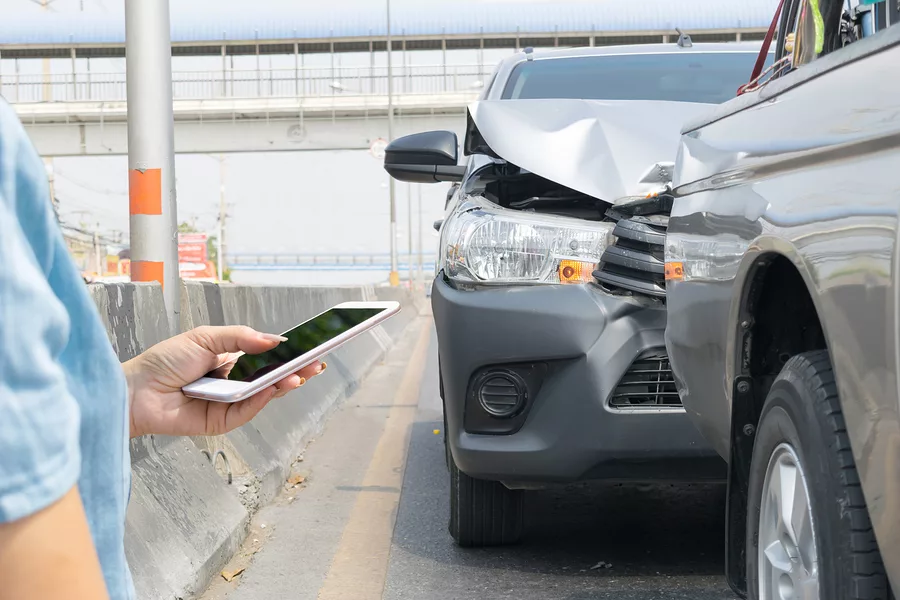I Got Into a Car Accident – Now What?
Car crashes have a way of making even the calmest and most collected among us flustered. Even a minor incident can have normally levelheaded people panicking. Thankfully, there are a few steps to take in just about every crash scenario. Follow these tips for safely and effectively handling the fallout from a car accident:
Move the Vehicles to Safety
Many car accidents are exacerbated by oncoming traffic that fails to spot the collision in time. This can add to a pileup situation in which even more people are injured. If it is possible to move the vehicles involved to a safer spot nearby, do so carefully. It’s a judgment call that can be tough to make. As long as the movement isn’t hurting anyone involved or seriously making the damage done to the cars worse, moving the vehicles to the side of the road is generally a good idea.
Check for Injuries
It’s important that people suffering injuries from the auto accident get medical attention as soon as possible. If no one in your vehicle was injured in the collision, check with the other motorists involved and see if they need an ambulance. Even minor injuries should be examined by paramedics, as a person’s adrenaline after a wreck can minimize pain. Sometimes the extent of the person’s injury isn’t fully realized until hours later. With that in mind, it’s best to have a professional check out any twinges sooner rather than later.
Should an car accident injuries worsen in the days following a wreck, it can be difficult to tie it back to the incident if there was no exam conducted directly following the crash. This can make it complicated for victims to seek compensation from the insurance company for their medical bills. Be proactive and get even the most minor of injuries checked out, just in case!
Call the Police
It’s a good idea to involve the police regardless of the level of seriousness of your accident. Because police deal with car accidents on a daily basis, their insight into your collision can provide unique perspective. Not only can the officer help direct traffic and protect the victims while they receive medical attention, their official police report can be an invaluable tool in the days and weeks following the collision.
When telling the police your side of the story, be careful not to admit fault. Directly blaming others can also be a bad idea. Instead, try to objectively explain what occurred and let the police draw their own conclusions. Chances are good, they will be able to ascertain who, if anyone, is at fault.
Exchange Information
Whether your accident was a minor fender bender or involved serious injuries and damage to your vehicle, it’s important to exchange information with the other driver. Be sure to collect their full name, home address, phone number and license plate information. Also collect their insurance company name and their policy number. It’s a good idea to write down the names and badge numbers of any police officers who assist on the scene, too.
Gather Evidence
If any witnesses were around to see the collision and are willing to go on the record, considering taking a short smartphone video of their statement. Include their name, address and phone number along with their take on what happened. This kind of evidence can be incredibly valuable in the coming weeks. Photos of the damage done to both cars and people can also come in handy, so be sure to take lots of pictures of the scene of the crash, as well as damage to any people or property. When you return home, resist the urge to throw away any torn or bloodied clothing. Even ruined t-shirts and jeans can play a valuable role in a car accident settlement negotiation.
File an Insurance Claim…
After leaving the scene of the crash, it’s important to report the incident to your auto insurance provider. Even if you’re unsure of which driver is at fault or responsible for the damages, a quick call to your car insurance company can clarify your options. If you’re in at “at fault” state, you may consider filing a claim with the other driver’s insurance provider if they are clearly to blame for the wreck. For those in “no fault” states, you’re required to file a claim with your own insurance company.
Before you call to file a claim, gather your documents and any other materials relating to the crash. You’ll want easy access to them when you describe what happened to the claims adjuster. Cooperate fully with the company as they conduct their investigation into the incident and be sure to share copies of any legal paperwork you have with the claims adjuster.
…Or Seek Legal Advice First
Not everyone contacts their insurance company to file a claim right away. Some seek the guidance of a personal injury attorney first. Though you should always reach out to your insurance company immediately after a wreck, you aren’t necessarily required to file a claim at that time. Consider sitting down for a confidential consultation with a car accident lawyer who can offer you insight into your legal options.
When is it necessary to hire an attorney? If anyone was seriously injured in the wreck or if the fault of the incident is in question, it’s a good idea to speak with a lawyer. Most car accident lawyers work on contingency, meaning that clients owe nothing unless they win or settle their case. With virtually nothing to lose, it can’t hurt to speak with an attorney about your options.
Caleigh considers herself an organizer with the ability to juggle many projects at all times, but if there’s one thing she laser focused on, it’s helping others save money. It’s with this eye on frugality and maximizing earning potential that she’s helped craft content for readers of our website.



